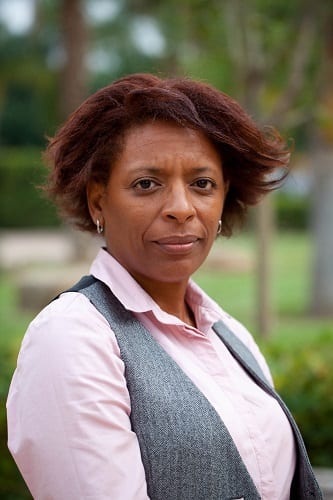In her first interview Charmaine Arbouin tells Olive Press editor Jon Clarke, about her fondness for the region and how she wants to best serve its expats
IT was during a summer road trip with her family through Spain at the age of 16 that she fell in love with the country.
¨Going to the Alhambra and the Mezquita in Cordoba was incredible, really inspirational,¨ explains Charmaine Arbouin, our new (wo)man in southern Spain.
A particularly cultural holiday, it started on the ferry from Dover and went through France, down into Spain, to Madrid, Segovia and finally Andalucia and Malaga.
¨The influence of the Moors and the closeness to Africa really struck a chord. It really opened my eyes,¨ continues Arbouin, who landed the plum job as British consul to Andalucia earlier this year.
She certainly appreciates the irony of coming full circle back to Malaga, where she is now overseeing the busiest British consulate in the world handling some 500 enquiries a month.
Neck and neck with Alicante, her remit is to cover the whole of Andalucia, as well as Ceuta and Mellilla and the Canary Islands.
¨It is a big area and we are certainly very busy,¨ explains the mother-of-three, in her first ever interview in the role.
Over lunch at Malaga’s traditional Meson Astorga restaurant (the British embassy’s head of media having flown down from Madrid to be at her side), she seems happy and relaxed in the new job.
Radiating warmth, she demonstrates a good command of Spanish, as she orders a series of mixed starters and a big bottle of mineral water.
She is certainly well qualified for the role, having already become well integrated in the region since moving to the Serrania de Ronda to live eight years ago.
The hispanophile – whose children (15, 14 and 12) all attended a small village school for seven years until they moved to the coast earlier this year – she studied Spanish at school and went on to read Spanish Studies at Hull University.
Working for many years in local government, and before that Oxfam on the Caribbean desk, her family had chosen to relocate to Andalucia because it had ´so much to offer´.
¨It had something for everyone,” she explains. ¨A rich culture with its fascinating Moorish heritage, world class monuments, friendly welcoming people, great cuisine, amazing climate, beaches, mountains, snow, something for everyone. Need I say more,¨ she adds.
¨It didn´t cross my mind to move here in my 20s and 30s, but as we got older we thought about looking for a different quality of life and Spain was ideal, being close to Britain… And even Morocco.¨
Indeed, Arbouin and her husband James Coventry (a social development consultant) like nothing more than spending a long weekend in the African country across the pond.
It was actually from a supplement in the Olive Press that they came across their favourite town Chefchaouen a few years ago.
¨We followed the guide to the letter, going to Chefchaouen and staying in Casa Hassan. It´s such a great, laid back place, quite different to the big cities like Tangier,¨ she says.
Like many people, their search for an appropriate home to buy in 2005 had been complicated as the property bubble grew so quickly.
They eventually settled in the charming Genal Valley, between Ronda and the coast, after initially looking in the Montes de Malaga area.
¨It was so hard to find places to buy back then. As soon as you saw something it was sold,¨ she recalls.
But they eventually found the perfect house to renovate in the charming village of Alpandeire and the children went to the local school, supposedly billingual, ´where they made up about half the pupils,´ she recalls.
Brushing up on her Spanish, she and her husband became well integrated into the Genal Valley area and kept a close eye on local politics and developments, including the infamous Los Merinos golf course development, near Ronda.
In particular, she shows considerable sympathy for the expat trio, including the former Lord Kilmarnoch, Alastair Boyd, who took on the developers and found themselves sued for 21 million euros.
It is issues like this, that she hopes her consulate can help with as much as possible.
One of the main problems involving expats at present is the issue of illegal homes, and the consulate knows of at least 4,000 Britons with properties with legality issues.
¨Those are the ones we know of and it is tragic what happened to the Priors,¨ she says, adding that they didn´t actually have the owners of the recently demolished homes in Cantoria, Almeria, on their radar.
¨We are lobbying with the Junta and the town halls to try and work through the properties we know about but we don´t have the resources to help them all.
¨These demolitions could happen to many of us and we are doing our best, but of course we cannot interfere with the local judicial system…¨
Under a new British embassy drive, she is also keen to prioritise the help the cónsul can give to expats and tourists in southern Spain.
¨We want to spend our time with the really vulnerable people. Those people hospitalised, deaths, people imprisoned, those with mental health issues.
¨Of course in serious incidents we can provide support but we want residents here to learn about which appropriate authorities to go to if they are in trouble.
¨They need to report things to the police before coming to us and, of course, we can help with a list of English-speaking lawyers.¨
Click here to read more News from The Olive Press.









An interesting interview, but some surprisingly inaccurate commentary from the new consul.
“her family had chosen to relocate to Andalucia because it had ´so much to offer´”
Debatable, for example it doesn’t offer good employment prospects, and it’s certainly not a good place to start a business. I’m not sure what an expat family would gain by moving to Andalucia unless they both already had very good jobs with long-term prospects and/or a lot of savings to tide them over. Relocating here without a job does not allow you to do anything, unless you are a retiree.
Relocation to Andalucia, for most working expatriates with a family, is a life of scraping by or having to work three jobs just to live, and of course totally impossible to do legally because the self-employment system here is just so ridiculously designed.
“of course we cannot interfere with the local judicial system…¨”
And that’s the crux of it really; the consulate can do just about nothing to assist with the daily injustices in Spain. Lobbying with town halls sounds like a total wasted exercise. I wonder what would happen if the consuls house was made retrospectively illegal? Now that would be an interesting story.